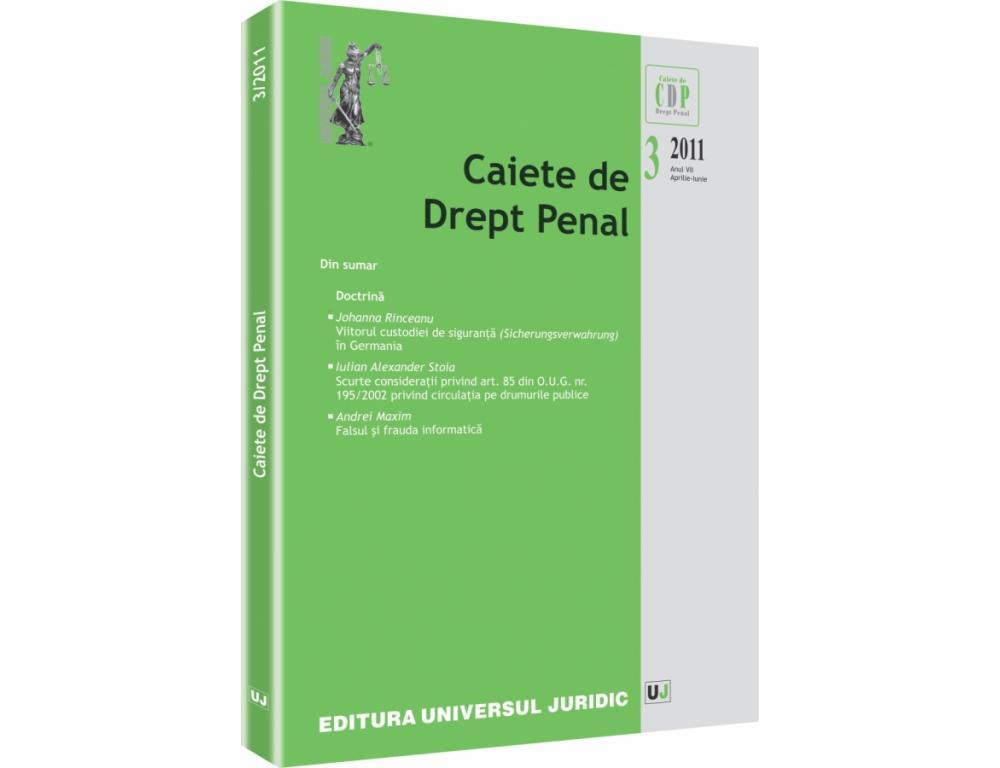Falsul si frauda informatica
Forgery and Computer Fraud
Author(s): Andrei MaximSubject(s): Law, Constitution, Jurisprudence, Civil Law
Published by: Universul Juridic
Keywords: forgery; computer fraud; computer crimes; cybercrimes; notion of document; Romanian criminal law; new Romanian Criminal Code; Comparative Law;
Summary/Abstract: This article aims to analyze in detail the forgery and the computer fraud, but it also draws some general conclusions, referring to computer crimes (cybercrimes) or to the notion of document as the object of forgery. In introduction, the author emphasizes the emergence of the crimes committed through computers, which, due to their complexity, can pose serious problems for the criminal law; it is reminded in this case, that the concept of space, as a fundamental category of the criminal law, is very poor in providing solutions, in terms of cybercrimes. In the introduction it is also described how these crimes occurred in the Romanian criminal law; thus, the texts contained in the Convention on Cybercrime, adopted in Budapest in 2001 have been transposed almost identically. Another aspect emphasized by the author is the fact that in the new Penal Code, which is about to take effect in Romania, the two crimes appear to be regulated this way – computer forgery in the chapter regarding offences of false and computer fraud at crimes against property. Each crime is then systematically analyzed, starting with their constitutive elements. Regarding the computer forgery, it is shown that it can be committed by a legal person or by a public servant, mentioning that in this last case, there is a competition with a corruption crime. However, the computer forgery does not have a passive subject, which is normal, according to the author, because forgery is a crime that by its nature protects the public trust. As an aspect of novelty in the criminal law – at least in the Romanian one – it is also argued that this crime has a material object, namely the forged computer data. So, it is not a concrete object, but an abstract one. From the perspective of ways to commit the offence, a more general regulation is suggested, emphasizing that, in the current form, the inaction is not incriminated. After having presented all the characteristics of the computer forgery, towards it, the author considers that the computer fraud is a special rule. Therefore, in the analysis of this crime there are only presented the novelty elements compared to computer forgery. For example, this crime also protects the property of the victim, not only the public trust in documents. A controversial issue is the relation between this crime and fraud. The author proposes a solution based on a rule of general criminal law, namely the principle of consumption. It is shown, across the study, that these two crimes protect the same main interest (or value), which is the private property. At the same time, through some of the factual situations described, it is also indicated that both crimes imply the same criminal resolution. With these assumptions, the author proposes that only the computer fraud would be held into account. Every argument brought by the author is also presented from the comparative law point of view. Otherwise, this method is, as shown by the findings presented, a necessity, because in the Romanian criminal law, this subject has not been studied in a serious manner, while in other law systems, such as the Spanish, German or south American ones, the situation is rather the opposite. Given that both crimes involve computer data forgery, the author concludes the study with a rather complex proposal, amending forgery into the Romanian criminal law. Thereby, it is considered that it should be regulated in the general part of the Penal Code, in a complex way, the concept of document, including both written documents, and the computer files. In this sense, the author brings as examples the Spanish and the German criminal law, indicating also some of their loopholes, in order for the Romanian legislator to avoid them. As a general conclusion, this study also implies an invitation towards a wider debate concerning the concept of computer crimes, because these, due to the novelty elements brought, might cause serious problems for the classical rules of criminal law.
Journal: Caiete de drept penal
- Issue Year: 2011
- Issue No: 03
- Page Range: 47-75
- Page Count: 29
- Language: Romanian
- Content File-PDF

